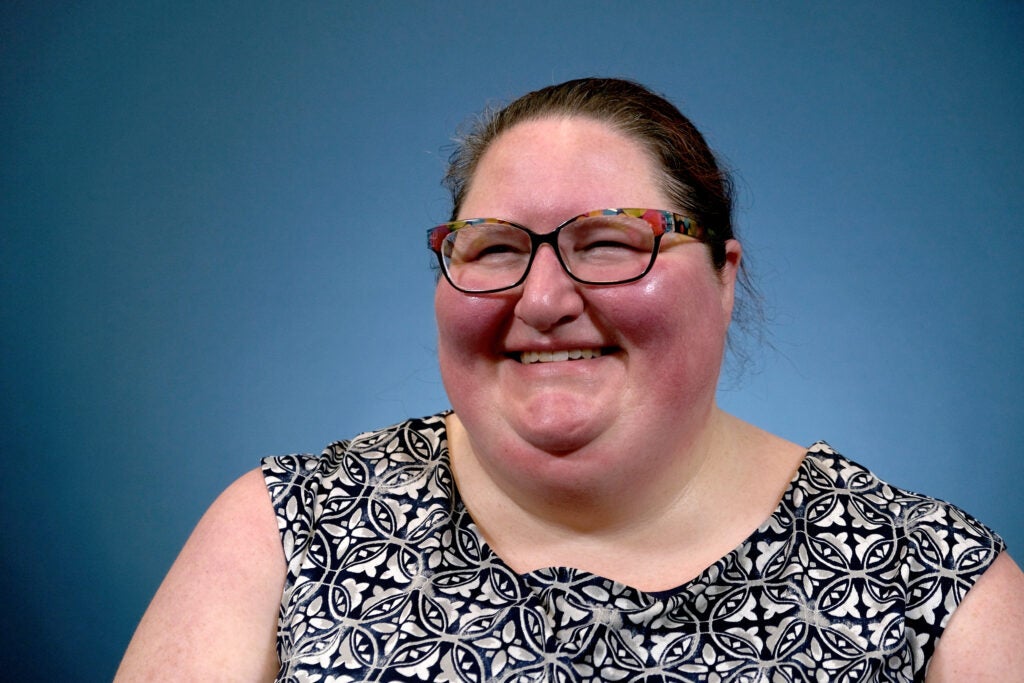In our Five-Question series, we highlight the staff and faculty behind the compelling work at Ariadne Labs.
Ami Karlage likes to joke that one of the challenges of working at Ariadne Labs has been figuring out her job title. As the official Senior Specialist for Writing at Ariadne Labs, she is a member of the Science & Technology Platform, but she also works with the Innovation Platform and acts as a consultant on literature review for teams and projects across the lab. Using her experience as a teacher, mentor, and tutor, she provides professional development and coaching to staff and faculty on writing and research techniques.
Karlage also likes to joke that she has worked at the lab “since dinosaurs roamed the earth.” She was working with Atul Gawande, MD, MPH, as a Research Assistant — performing background research, fact checking, and editing for his writing projects — when he and Bill Berry, MD, MPA, MPH, co-founded the lab in 2012. She has worked here since.
Karlage, who grew up in Kentucky, has a B.A. in History and Science from Harvard University and is trained in oral history as well as more traditional historical research practices. She is known around the lab for her extensive knowledge, her ready wit, and her skills in making buckeyes, a chocolate and peanut butter treat that delights the staff every holiday season.
Q: What inspires you most about Ariadne’s mission and work?
A: I think it’s the fact that we take on real problems. We don’t always fix the problems — we’re up against some pretty gnarly challenges — but we do make things better for a lot of people. Through the Ariadne arc of “design, test, spread,” we thoughtfully design what we do, test it to make sure that it works, and then send it out into the world to be used, hopefully at scale, to solve the problems that the health care system is suffering from.
Q: You’re on the labs’ Science & Technology Platform. What is unique about Ariadne’s use of platforms?
A: It’s unique that we have technical process experts. A lot of organizations in this space, I think, have content expertise. So they’ll be experts in childbirth or end of life care or surgery. But we also have experts in the ways we do things. We have experts in scientific methodologies, human-centered design, and implementation. Bringing all that expertise together means that what we come up with and what we test and spread is going to be that much better.
Q: What are some of the projects you are currently working on?
A: I’m working with the Primary Health Care team, which is trying to help other organizations scale up a behavioral health integration for pediatrics intervention. I’m also working on a project that is examining dementia care. We are trying to figure out the lay of the land of dementia care and the problems and potential solutions. In other words, we’re currently honing on what’s the problem we want to solve and how are we going to do that. We are in our final round of research and then we’ll be doing some synthesis work and coming up with the next steps.
Q: What do you mean by “synthesis” work?
A: It’s what I call looking at something upside down. It’s something Atul used to do in the lab a lot. It’s where you come into a project and everybody is sort of in the weeds and focusing on details and then you come in with the 10,000-foot view, going, “Yeah, but have you turned it upside down and started shaking it?” When you do that, it suddenly looks like a whole new thing. The research is still relevant, but you get a different perspective on it, and that new perspective hopefully sends you in a new direction or gets you closer to your goal. We’ve settled on the word “synthesis,” because it’s taking a bunch of information and looking at it differently. And that’s the great thing about Ariadne: the people are incredibly open. They are open to having a historian of medicine come in, sit down at their table, and say, “That’s nice data. What does it mean? What are we going to do with it? Can we twist and turn it to make it do this? Or to understand this?” Not in the sense of cherry picking data or anything like that, but just in the sense of better understanding the narrative that the information tells us.
Q: What work are you most proud of at Ariadne Labs?
A: I am really proud of the work I did with Atul Gawande on researching and helping to edit his book Being Mortal: Medicine and What Matters in the End. It was kind of a game changer. Previously there was all this talk of death panels, and his book about how people can play a role in decisions about their serious illness care really opened up the conversation. It took the conversation away from the snap judgments and politicized views and sparked a much more meaningful national conversation about how we care for people at the end of life. Atul was starting up Ariadne while he was writing the book and after meeting and working with Susan Block, MD, (a national leader in the development of palliative medicine), Ariadne’s Serious Illness Care Program was created.
I’m also proud to say Being Mortal was the beginning of Ariadne’s obsession with Post-it Notes. Atul and I took over a conference room for a while and wallpapered it in Post-it Notes. Each one had a different piece of information written on it, and we’d swap them around and around, trying different structures for different chapters. Other Ariadnerds picked up the habit, and now, Post-it Notes are everywhere.




